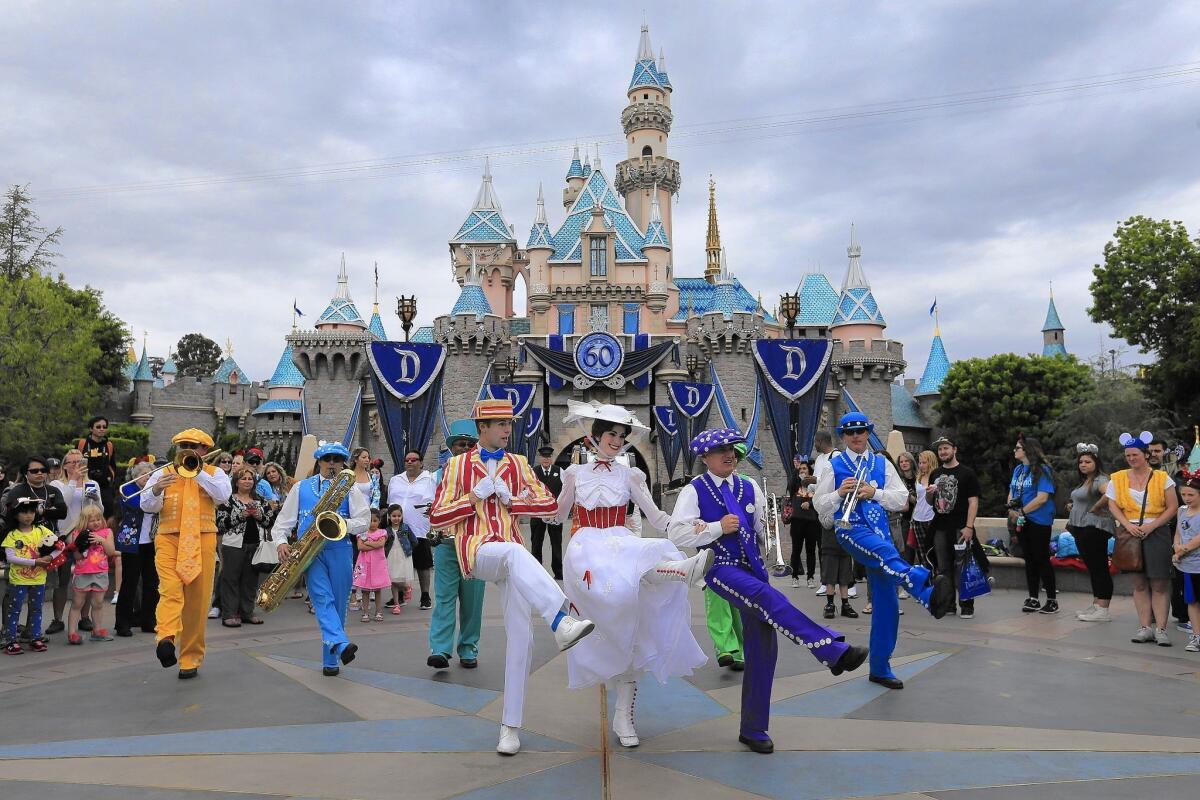Anaheim mayor gets into deep political waters in clash over Disney tax break

Anaheim Mayor Tom Tait entered battle this week in a meditative mood, having helped the Dalai Lama celebrate his 80th birthday in the city.
Tait was doing something that few politicians have done in Orange County’s largest city: Publicly taking on Disneyland, the community’s biggest employer and tax generator.
At issue was a proposal pushed aggressively by Disney that would exempt the company if Anaheim ever imposed a gate tax on theme parks. Disneyland already has such an exemption, but the plan would extend it by at least 30 years.
In exchange, Disney has promised to spend $1 billion on its Anaheim parks, building new attractions and a new 5,000-space parking lot. Construction is due to start in 2017. If Disney spends an additional $500 million, the agreement would be extended to 45 years.
Many in the city supported the proposal and urged the city to act immediately.
But Tait remained wary, saying he strongly backs Disney but doesn’t want to deprive voters of their right to institute a new tax if they think it’s necessary.
“This just shouldn’t happen,” Tait said about 12:45 a.m. Wednesday during a marathon meeting on the proposal.
“I think, down the road, people will rue this day. Other people will look at us and say that we gave away the people’s right to vote.”
Despite the plea, the City Council voted 3 to 2 to grant the extension.
The debate in Anaheim offered a window into the delicate politics of challenging the Happiest Place on Earth.
The city has enjoyed a long and mostly prosperous relationship with Disney, through park expansions, the establishment of California Adventure in 2001, the opening of Cars Land in 2012 and the entertainment company’s foray into professional sports with the Ducks and the Angels.
Both of those new parks involved investments of around $1 billion in Anaheim, and the city enthusiastically backed them. And by supporting Disney’s sports dreams, the city received a long-sought reward: Both teams had “Anaheim” added to their official names before Disney eventually sold them.
Today, Disney remains a behemoth in the city. It employs around 28,000 people, and the city already receives a sizable portion of its tax revenue from the company. In 2014, $56 million came into the city’s general fund from Disneyland Resort, according to company officials. That represented a third of all taxes generated in Anaheim’s tourism district.
For some on the City Council, the extension of the exemption is just one more step in this partnership.
“I think this will be remembered as a hallmark opportunity for economic development,” said Councilwoman Kris Murray.
Michael Colglazier, president of Disneyland Resort, echoed that view.
“Anaheim has a legacy of city leaders who chose optimism — leaders who knew that the future could be one of growth and opportunity,” he told council members at the meeting. “And Disney has partnered with those leaders for over six decades to create a vibrant and enduring economic engine for the city.”
Mayor Tait said his opposition focused in part on how fast officials had moved on the bill. The measure was introduced nine days earlier, shortly before the Fourth of July holiday weekend.
“This is the people’s right to vote,” said Tait. “It’s ironic that we got nine days notice over the Fourth of July to look at this.”
Tait has served on the City Council for 20 years and was elected mayor in 2010. He owns an engineering and environmental firm.
He helped negotiate a similar deal with Disney in 1996, while working as a member of the Anaheim City Council. At the meeting Wednesday, he said he regretted that decision.
Anaheim doesn’t currently have a gate tax. If voters decided to levy one in the future, the terms of the new agreement say that the city would have to reimburse the amount Disney pays in said tax.
Tait said the agreement ties the hands of voters. Despite accusations that he wants a tax, he stressed that he doesn’t support any new tax on the corporation. He said he just doesn’t like that voters don’t have the ability to put one in place if they wanted to.
“I don’t know of any other city that gives a company the veto over the vote of the people,” Tait said Thursday. “In that room you had special interests versus the people.”
Anaheim spokesman Mike Lyster said Disney reached out to the city in late May, saying it was mulling expansion plans worldwide. Throughout June the two sides discussed the proposed agreement before a public notice was issued on June 25.
The plan sparked a passionate debate in the city.
Norma Trujillo, a team manager in the workers’ compensation department of Disney — and a longtime Anaheim resident — was grateful the exemption passed.
A single mother of two, she has worked at Disney since 2001 and said the company allowed her a more flexible schedule. Her daughter also worked at the park during college and is now studying for her doctorate in molecular biology.
“Disney has always been very special to me,” Trujillo said. “I came out because I wanted to tell my story and how I relate to this issue.”
Jeff LaTourneau, who used to work as a union representative for restaurant and hotel workers at Disneyland, spoke out against the tax break even though he said the park has long played an important role in his life.
From 1983 to 1993, LaTourneau spent countless hours negotiating with Disney higher-ups during his time as the union representative for the hotel and restaurant workers. Despite its intransigence on certain issues, he said, Disney was fair-minded.
LaTourneau is gay and HIV-positive. During his time as the vice chairman of the LGBT Center of Orange County and other organizations, he always made sure the groups had their banquets at the resort’s hotel because of the corporation’s support and recognition of domestic partnerships.
But he felt the tax exemption went too far, especially given the city’s changing demographics and the economic struggles some of its residents deal with.
Anaheim is now more than 50% Latino. Next year, the city is moving from at-large to district elections after a lawsuit from the American Civil Liberties Union aimed at increasing political representation for Latinos.
LaTourneau said the exemption ties the hands of those who might run the city in the future.
“This was an end-run in advance of what is around the corner,” he said. “This is the people’s money that they’re giving away to private companies.”
More to Read
Get the Latinx Files newsletter
Stories that capture the multitudes within the American Latinx community.
You may occasionally receive promotional content from the Los Angeles Times.







